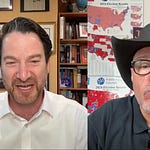As tensions escalate between Iran and Israel, the U.S. faces a pivotal moment that demands more than reactive outrage - it demands hard questions. This is because before we get involved in another war in the Middle East - even if it’s to help a sturdy ally like Israel - we need to know what we’re doing.
That’s why I’m happy to be on this journey with you as we navigate these challenging days together, by having you as a subscriber to The Briefing Book. I’ll also be on CNN today at 4pm Eastern to discuss the war further and hope you can tune in.
So here are some questions that I’d like to throw out there:
What does Israel want to achieve militarily — and is that achievable without triggering a broader conflagration? Can Israel destroy the Fordow nuclear facility on its own or are we the ones that will need to do the deed, lest Iran’s enrichment capacity stays underground and protected? Will regime change in Iran make Israel safer or more insecure?
If we do bomb, are we ready to face the humanitarian fallout, the loss of civilian life, and the destabilization of an already fragile country? What comes next inside of Iran? Will there be a transition to an organized democratic entity or will the remnants of the Iranian military and its Revolutionary Guard take over and create a more militarized - yet non-nuclear - dictatorship? And how will the U.S. engage such an entity?
And what is Iran’s endgame? The Supreme Leader seems to want to hold on to Iran’s nuclear enrichment capacity at all costs - even if it risks getting blown up. He’s already witnessed his proxies like Hezbollah and Hamas suffer similar fates at Israel’s hands and didn’t change direction. Is he truly going to go until the end (spoiler alert answer: it’s probably yes.)?
And what about the others in the region, if we strike? Will our Arab allies sit on the sidelines (likely!) and will Hezbollah, the Houthis, and Hamas be relatively quiet, as they have been so far? Will Iran unleash terrorist proxies around the world? Remember, Iran is the world’s leading state sponsor of terrorism for a reason: it’s earned that distinction and can unleash terror around the world (not to mention attack and potentially close the Straits of Hormuz to commercial and oil traffic).
And perhaps most crucially, what does the “day after” overall look like? Because history has taught us: wars without endgames breed more chaos, more terrorism, and less security. So we better have that answer in formation, somewhere. Do we have a diplomatic strategy to get the word out to our allies and the region about our plans for the day after? We’ll likely need their help.
This is not a moment for slogans or talking points. It’s a moment for rigorous strategy, strong diplomacy, and smart military decision-making. We need American leadership that asks the right questions before we stumble into the wrong answers.













Share this post